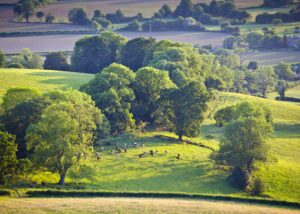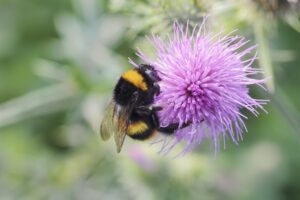What is Natural Capital and why is it important?
20th June 2023
You will almost certainly have heard some mention of Natural Capital (NC) by now as it has been the hot topic of the year so far for most of our landowner or farming clients. Through this article, Birketts explores what NC is, and also where you might expect to be able to obtain funding to support any NC projects you might have in mind.

What is Natural Capital?
Natural Capital is a term that encompasses the value to humans of all natural assets, living organisms and the land on which these exist. The Government’s Green Book defines this as: “Natural capital includes certain stocks of the elements of nature that have value to society, such as forests, fisheries, rivers, biodiversity, land and minerals. Natural capital includes both the living and non-living aspects of ecosystems.”
As part of their legal work, Birketts will typically talk about Natural Capital as being split down into biodiversity net gain (BNG), nutrient neutrality and carbon capture.
- BNG is an increase in biodiversity as measured against a baseline. From November of this year most large development sites will be required by law to provide an increase of 10% in biodiversity post development compared to the pre-development baseline. This is a biodiversity net gain of 10%. This requirement will bite for smaller sites from April of next year. Landowners can offer their land up for the provision of BNG units for developers who need to buy units to mitigate the loss of biodiversity caused by their developments.
- Nutrient neutrality is also a planning requirement, providing that after development has taken place no more nutrients will enter a particular water source than were entering it before the development took place. The resulting pressing need for developers to offset nutrients from their developments by enhancements elsewhere once again offers real opportunity to farmers and landowners to leverage the potential of their land to capture or to be a reduced source of nutrients. This can be achieved through a range of solutions such as converting farmland into woodland or the creation of reed beds to process effluent.
- Carbon capture is the use of vegetation, peatland restoration and soil management to capture carbon dioxide and hold the associated carbon so as to reduce atmospheric carbon dioxide concentrations. Businesses are increasingly looking for ways to off-set any unavoidable carbon dioxide emissions. One way to do this is to purchase carbon credits, generated as a result of NC solutions, e.g. woodland creation. Assurance schemes such as the Woodland Carbon Code have been established to ensure that purchasers of credits can link these to quantified and verified emissions mitigation.

How can I fund Natural Capital projects?
Natural Capital mitigation solutions give rise to new opportunities for both landowners and farmers in the guise of new income streams arising out of monetising activities that they may already be engaging in, or by providing an incentive to modify their existing practices in order to be eligible for public or private funding.
Public funding
There are three new government-funded schemes – the Sustainable Farming Incentive (‘SFI’), Countryside Stewardship (‘CS’) and Landscape Recovery.
Under the Sustainable Farming Incentive, farmers and land managers will be eligible to apply if they were eligible for the Basic Payment Scheme. They will be paid to engage in those activities which improve water quality and biodiversity, and which mitigate climate change.
Countryside Stewardship is intended to provide financial incentives for farmers, land managers and foresters to look after and improve the environment. DEFRA tell us that CS grants will include ‘an extra incentive… for land managers to join up across local areas to deliver bigger and better results.’ These ‘clusters’ of land managers will facilitate a greater financial return for those ecologically beneficial activities delivered at scale. Birketts is already helping several clusters achieve these funding aims through various means, including through collaboration agreements and special purpose vehicles.
Landscape Recovery can be used on combination with some CS grants and the second round is now open for applications. These grant funded projects are intended to be used by those who want to take a more radical and large-scale approach to producing environmental goods on their land.
Private funding options
There are several broad options available to you as a landowner through which you can access private funding to help exploit the natural capital assets your land offers.
First, if you can provide land on which habitats can either be enhanced or created to generate biodiversity net gain units then a number of options are available to you. A developer may prefer to buy your land on which to generate its own units when it cannot do so on its development site. Equally, a developer may prefer to let land from you, and you could provide the units by managing the land in the required manner. Finally, you may be approached by habitat banks who will let you land and contract with you to manage the land so as to generate units which it, in turn, sells to developers.
Secondly, your land could be used for nutrient neutrality schemes. Whether your land will be suitable will be far more dependent on its location then for either BNG or carbon projects. Birketts is seeing land being purchased or let by developers who wish to construct created wetlands which filter water runoff from developments. Birketts is also advising clients who are contracting with developers to either put their land to a particular use (eg. plant cover crops) or to cease carrying out particular activities on their land (eg. reducing the volume of nitrates and phosphates used in normal farming processes).
Finally, you might consider the benefit of carbon sequestration or, where relevant, peatland improvement. Your land may be of use to third parties who will pay to use your land to capture carbon in this way or you may prefer to create carbon credits which can be sold onwards to those who need them.

Get in touch
Birketts have one of the largest dedicated Natural Capital teams in England, with specialists who have many years of agricultural, planning and environmental, commercial, and land development expertise to draw on in advising clients on their Natural Capital ventures. Find out how you can make the most of Natural Capital or visit the Birketts stand at Groundswell on the 28th and 29th June 2023.
